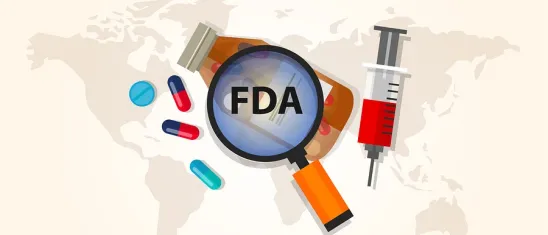The U.S. Food and Drug Administration (FDA) recently announced what appears to be the first public warning made by the agency to a company promoting an approved prescription drug product for the unapproved use of treating COVID-19 symptoms. Although the regulatory action was announced in the FDA’s daily pandemic update on October 2, 2020, the warning letter issued by the Office of Prescription Drug Promotion (OPDP) is dated September 22, 2020.
This latest OPDP warning letter was sent to the marketer of generic versions of a drug called Budesonide Inhalation Suspension (an asthma medication) after OPDP received complaints about the company’s promotional tactics from health care providers through the Bad Ad Program, which educates providers about requirements for prescription drug promotion and encourages them to report potential violations to the FDA. As summarized by the agency in its October 2 announcement, the generic drug company’s CEO and a sales representative had distributed various emails to health care providers that:
“provide evidence that Budesonide is intended for a new use for which it lacks approval, specifically the treatment of symptoms associated with COVID-19, and for which its labeling does not provide adequate directions for use. This renders Budesonide misbranded within the meaning of the Federal Food, Drug, and Cosmetic Act (FD&C Act) and makes its distribution violative. The emails are also false or misleading in that they represent that Budesonide has certain benefits, but fail to include any risk information about the drug. This also renders Budesonide misbranded and makes its distribution violative. These violations are concerning because they create a misleading impression about the safety and effectiveness of Budesonide for the treatment of COVID-19 and suggest a use for which the labeling does not provide adequate directions for safe and effective use of the product.”
From our perspective, this public FDA action is notable for two distinct policy reasons. First, it appears to represent the first enforcement letter related to an FDA-approved drug or biological product that was being promoted for the treatment of COVID-19. Although there have been over a hundred FDA warning letters (and many more Federal Trade Commission letters) sent to the marketers of fraudulent and unapproved products being sold to treat, prevent, or diagnose the disease caused by the novel coronavirus – see our last post on this topic here and the FDA’s database of those letters here – there have no previous letters issued by the OPDP or its counterpart office for biological products (called the Advertising and Promotional Labeling Branch, or APLB) as a result of off-label COVID-19 claims disseminated by an approved product’s manufacturer or distributor.
Second, the date of the OPDP warning letter (September 22) corresponds with the FDA’s announcement of its release of a revised proposed rule aimed at amending its “intended use” regulations. The agency made these revisions in response to widespread concern surrounding a January 2017 final rule on the same subject that never went into effect (and which we blogged about at the time). The agency’s revised proposal for how it would consider different types of information as evidence of a marketer’s intended use for a medical product attempts to respond to industry concerns that the 2017 final rule was too broadly worded. [Comments on the revised proposed rule are being accepted through October 23, 2020; see Federal Register notice and docket information here.]
The concurrent release of this proposed rule and the issuance of the OPDP warning letter to a legitimate product marketer for unapproved COVID-19 claims may be completely coincidental, but we found the timing of these two actions to be interesting. Perhaps more importantly, however, the warning letter is an important reminder that all prescription drug advertising and promotion should comply with the FD&C Act and the FDA’s advertising regulations, including by ensuring that a fair balance of benefit and risk information is presented in all promotional materials. Companies should remember that while health care providers are free to use any drug or biologic off-label in an exercise of their professional discretion and with fully-informed patient consent about such an unapproved use, advertising and promoting a medical product for that unapproved use renders the product misbranded under federal law. That can cause a slew of downstream problems for the marketer, in addition to receiving a warning letter from the FDA that is then made public.
We will continue to monitor OPDP and APLB actions related to unapproved COVID-19 claims to determine whether a new enforcement trend may be emerging, as the pandemic evolves from an acute emergency to a more chronic one.




 />i
/>i

